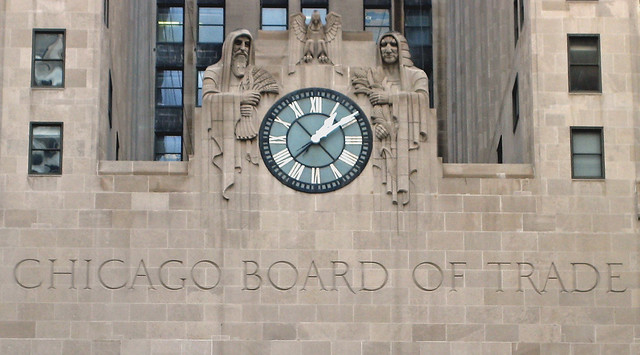
source
Note: This was expanded and published on Seeking Alpha August 9, 2010: The Problem with Agricultural Commodity ETF's.
Since there's no place to hide with your savings these days it would seem logical to invest in commodities which should have real value in times of hardship.
That broken record, Jim Rogers, has used the recent Russian wheat crop failure to once again tell the world that the key to investment security in the future is owning agricultural commodities. I'm not a Rogers fan, as readers here know, since he was telling CNBC that the world was short of grain when it wasn't, back in January. Also, because I don't see Ag commodities as a sure thing because they are reliant upon government policy which will be stressed in a debt-laden future, and global macro economic conditions. But, that, is another subject and not the point of this article.
So, let's say that you are one of those people who has decided that a logical and safe place to put savings is into agricultural (or oil and other) commodities. Next, when considering your options, you decide that an agricultural commodity ETF is a good way in which to do that.
Business Week's July 22, 2010 cover story, Amber Waves of Pain warns investors that when commodities go up, commodity ETF's often don't.
From the article:
Contango isn't the only reason commodity ETFs make lousy buy-and-hold investments. Professional futures traders exploit the ETFs' monthly rolls to make easy profits at the little guy's expense. Unlike ETF managers, the professionals don't trade at set times. They can buy the next month ahead of the big programmed rolls to drive up the price, or sell before the ETF, pushing down the price investors get paid for expiring futures. The strategy is called "pre-rolling."
"I make a living off the dumb money," says Emil van Essen, founder of an eponymous commodity trading company in Chicago. Van Essen developed software that predicts and profits from pre-rolling. "These index funds get eaten alive by people like me," he says.
A look at 10 well-known funds based on commodity futures found that, since inception, all 10 have trailed the performance of their underlying raw materials, according to Bloomberg data.
Business Week uses the U.S. Oil Fund (USO) ETF as an example of what can happen to a commodity ETF. It has dropped fifty percent since its inception April 2006, during which time period crude oil has risen eleven percent. Also, it cites the total return on the DB Agriculture Fund (DBA) being 3 percent since January 2007, while the weighted average of its commodity components has risen 19 percent.
If you are an investor in Ag commodities or are thinking about becoming one, the above 7-page article is a MUST-READ. And then, when you are done with that article, to find out about newfangled, derivative-laden, quant-created extreme-ETF's, read ETF's Gone Wild from Bloomberg. The old John Bogle days of simple index investing through the use of ETF's was just too tempting of a target for the vultures wishing to take part in it.
In essence, just when you thought the investment interests couldn't become more stacked against the small investor in plain sight of government regulators, it has hit a new low. Once again, if you make any investment decision, you simply must understand the product and read the warnings in the prospectus that you are investing in. Not every commodity ETF investment may be a poor choice, but you need to understand how they are being traded and include that in your own risk of return assessment.
--Kalpa
~~~~~~~~~~
Disclaimer: I do not have the time at present to investigate information about which of the agricultural ETF's in existence may more directly correlate to the actual commodity. And, I have no investments in this area.


